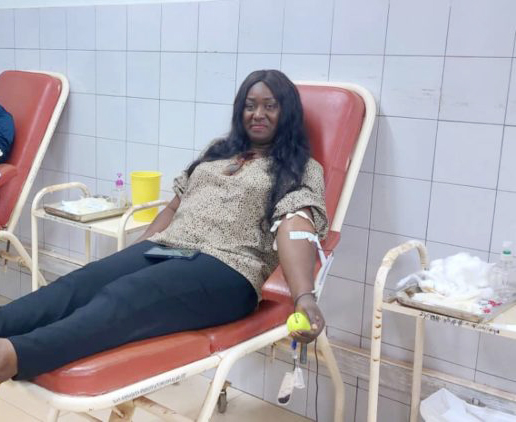Women's participation in blood donation: an essential bonus
- Posted on 28/08/2025 13:05
- Film
- By kolaniyendoumiesther@gmail.com

Extract from the article: Every year, days dedicated to women are commemorated. These are moments set aside to celebrate progress and remember the struggles for equality. These days can also be a crucial time to raise awareness among women about a life-saving act of solid....
Every year, days dedicated to women are commemorated. These are moments set aside to celebrate progress and remember the struggles for equality. These days can also be a crucial time to raise awareness among women about a life-saving act of solidarity: blood donation. This act is of paramount importance, particularly in African countries where blood product shortages are a tragic reality.
In
many African countries, blood shortages are a major cause of maternal deaths.
Thousands of women lose their lives every year during childbirth due to
uncontrolled bleeding and a lack of available blood. In Togo, for example,
statistics show that postpartum hemorrhage is the leading cause of maternal
mortality. A study conducted at the Sylvanus Olympio University Hospital in
Lomé, entitled “Postpartum hemorrhage: clinical, therapeutic, and evolutionary
aspects at the Sylvanus Olympio University Hospital in Lomé (Togo),” highlights
that although postpartum hemorrhage is the leading cause of maternal mortality
worldwide, the death rate is extremely high in Togo, higher than in many
developing countries. The maternal mortality rate is high, with 399 deaths per
100,000 births. An adequate blood supply could significantly reduce these
figures and thus save lives. Blood donation is an essential link in breaking
this cycle of mortality and improving women's quality of life.
Women
underrepresented among blood donors in Togo
Women,
who are often the first to be affected by complications related to childbirth,
are also the most numerous and most likely to understand the urgency of this
situation. Their children, colleagues, and friends may one day need blood.
However, women's participation in blood donation is sometimes lower than that
of men in blood transfusion centers. More comprehensive reports from the WHO in
2013 indicate that only 30% of global donors are women, with proportions
varying considerably from one country to another. In 18 of the 104 countries
analyzed, only 10% of donors are women. Nevertheless, it must be recognized
that many factors reduce women's participation in blood donation: physiology,
which requires an interval of at least four months between donations, unlike
men (three months); contraindications to blood donation such as pregnancy,
breastfeeding, menstruation; and the exclusion of transfusion recipients from
blood donation. For all these reasons, the proportion of women in the donor
population is low. Since blood donation is an act of solidarity, it seems
normal that men donate more blood for transfusions to women. However, it is
well within the power of women to substantially increase their participation in
blood donation.
Essential
mobilization
International
Women's Day, for example, is an opportunity to call for women's commitment and
involvement in all areas. Blood donation is a powerful example of this. By
mobilizing for this cause, women can become true everyday heroes, increasing
the supply of blood products and improving the chances of survival for blood
recipients, the majority of whom are women. Every donation counts, and every
woman has the power to make a difference for her community and for the future.
For several years now, the CNTS has taken the opportunity of International Women's Day to invite women's organizations to include blood donation as an important activity in their celebrations. In fact, women have become the majority of donors on this day. By building loyalty among these women who have chosen this occasion to donate blood, we can increase women's participation in blood donation.
To
donate blood in Lomé, go to:
-
The National Blood Transfusion Center (CNTS), located in Doumasséssé, near the
Doumassessé II public elementary school and the EAMAU. The center is open
Monday through Friday from 7:30 a.m. to 6 p.m. and Saturday from 8 a.m. to 1
p.m. Toll-free number: 8214.
-
PCD Tokoin, located in the Sylvanus Olympio University Hospital behind the
hemodialysis department: open Monday to Friday from 7:30 a.m. to 4 p.m. without
interruption, Tel: 92 13 89 89
-
PCD Kpalimé, located in the Kpalimé Regional Hospital next to the laboratory
department: open Monday to Friday from 7:30 a.m. to 4 p.m. without
interruption, Tel: 70 53 66 66
-
PCD Atakpamé, located in the Atakpamé Regional Hospital next to the laboratory
department: open Monday to Friday from 7:30 a.m. to 4 p.m. without
interruption, Tel: 70 91 33 33
-
PCD Afagnan, located in the ST Jean de Dieu Hospital in Afagnan next to the
laboratory department: open Monday to Friday from 7:30 a.m. to 4 p.m. without
interruption, Tel: 70 86 55 55.
Esther KOLANI




